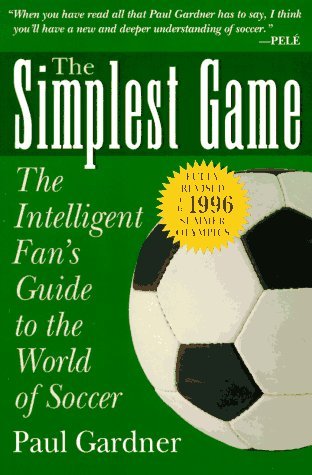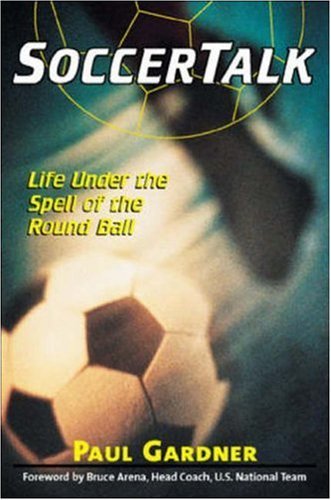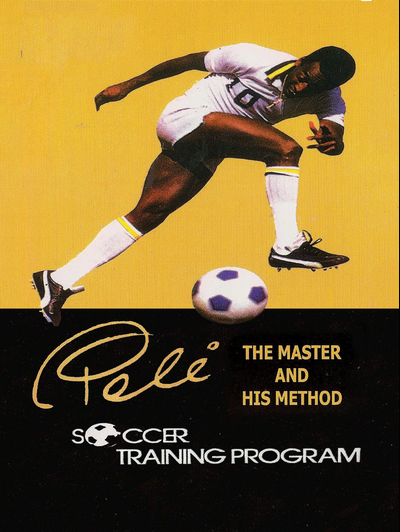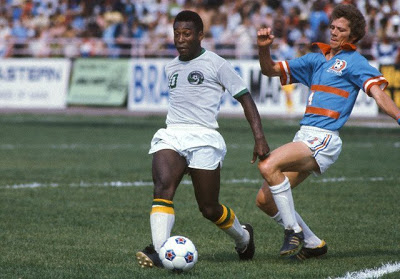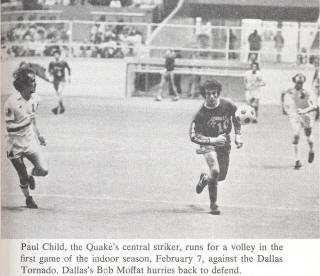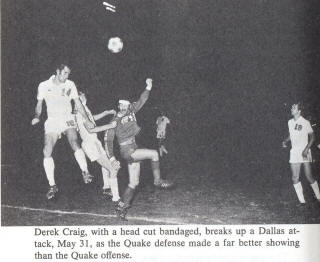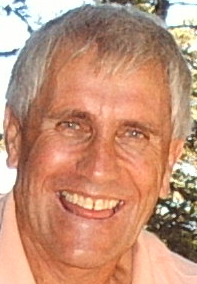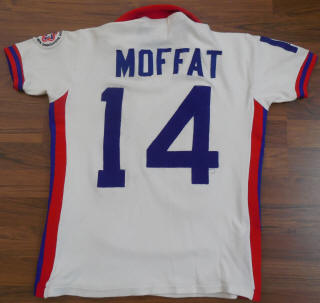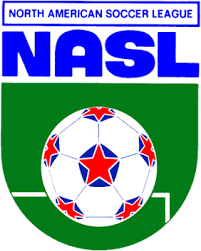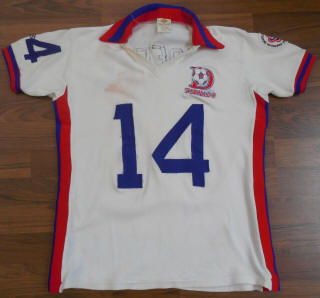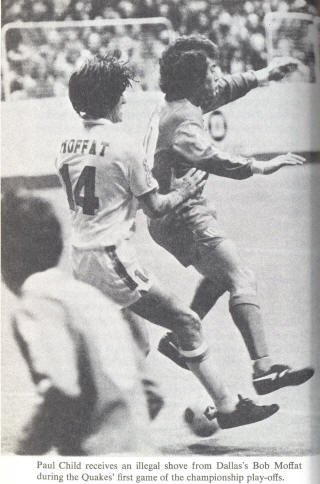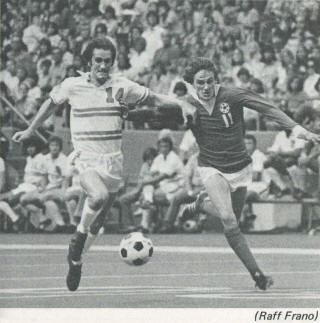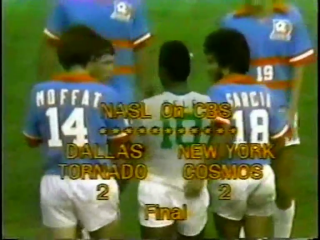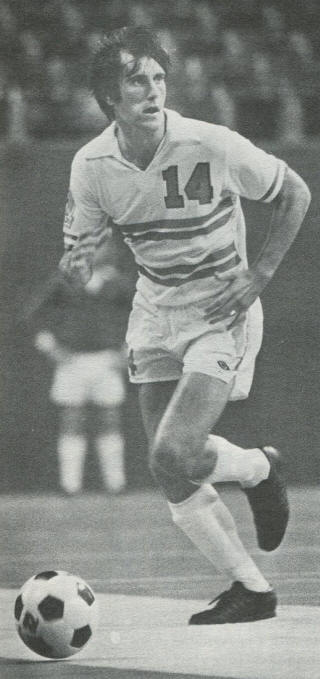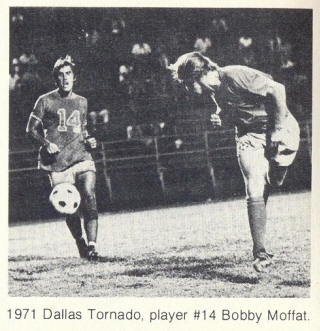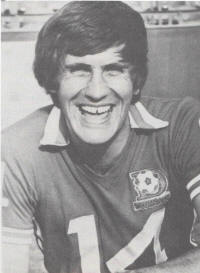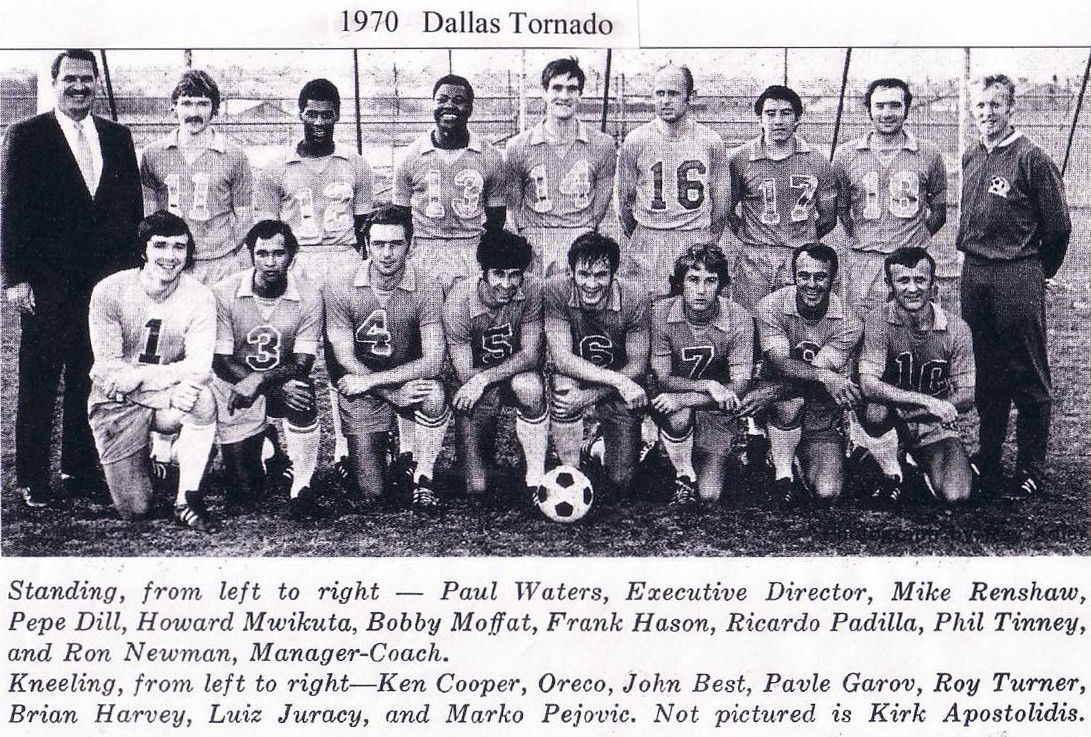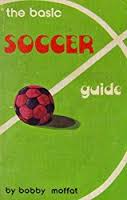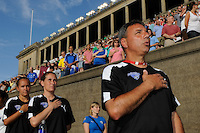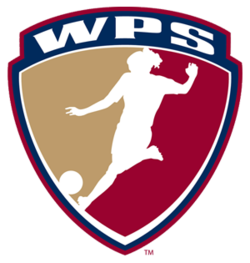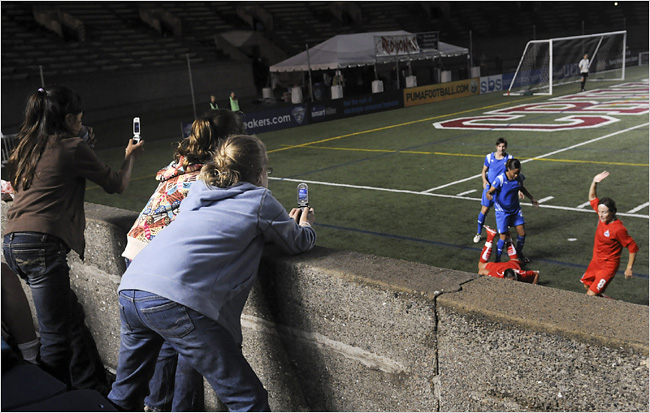Perennial NASL and MISL soccer all-star Clyde Best (The Acid Test: The Autobiography of Clyde Best) joins Tim Hanlon from his native Bermuda to discuss his 1970s/80s soccer adventures in the United States, emanating from his stellar, but challenging beginnings with England’s First Division West Ham United. Best recalls his first matches in a five-team 1969 NASL, when the Hammers spent the summer masquerading as the Baltimore Bays; recounts a hot and steamy friendly a year later at New York’s overcrowded crackerbox Downing Stadium, matching his childhood idol Pelé goal-for-goal; describes his magical first full season in the States, winning both the NASL’s outdoor and indoor championships with the Tampa Bay Rowdies; and waxes nostalgic on his subsequent career stops in Portland (Timbers), Cleveland (Force), Toronto (Blizzard), and Los Angeles (Lazers).
EPISODE #09: Documentarian Mike Jacobs & the International Volleyball Association
Award-winning ESPN 30 For 30 sports documentarian Mike Jacobs (The High Five; The Pittsburgh Drug Trials) joins Tim Hanlon to discuss his new film Bump & Spike, which recounts the curious tale of the 1970s International Volleyball League – the short-lived pro co-ed circuit hatched by Hollywood moguls, fueled by a basketball legend, and ultimately undermined by a combination of sketchy ownership and a US Olympic boycott. Jacobs relates how TV/movie producer David Wolper charmed his entertainment industry friends into co-founding the IVA; describes how volleyball-loving Wilt Chamberlain became the versatile promotional face of the league; explains how teams successfully blended star talent from both Olympic national teams and California beaches; and speculates as to why the IVA eventually collapsed under a “haze” of financial instability.
Bump and Spike Trailer from Strike Anywhere on Vimeo.
ESPN Films 30 For 30 Shorts: Volume 2 (including The High Five) - buy digital video here
ESPN Films 30 For 30 Shorts: Volume 3 (including The Pittsburgh Drug Trials) - buy digital video here
EPISODE #08: Documentarian Dan Forer & the ABA’s Spirits of St. Louis
Emmy Award-winning TV producer and ESPN Films 30 For 30 sports documentarian Dan Forer (Free Spirits; Mike and the Mad Dog) joins Tim Hanlon to discuss the curious two-year odyssey of the American Basketball Association’s colorful Spirits of St. Louis franchise, whose impact still continues to haunt the modern-day NBA, forty years after the team’s demise. Forer describes the importance of mercurial star forward Marvin “Bad News” Barnes to both the club’s success and the making of the Free Spirits documentary; why Spirits brother-owners Dan and Ozzie Silna declined to participate in the making of the film; how a baby-faced kid out of Syracuse named Bob Costas got his first professional sportscasting gig; and how three of the team’s most talented players effectively lost their careers to the evils of drug addiction.
ESPN Films 30 For 30: Free Spirits (DVD) - buy DVD here
ESPN Films 30 For 30: Volume 2 (including Free Spirits) - buy digital video here
EPISODE #07: “Krazy” George Henderson & The Art of Pro Sports Cheerleading
America’s most famous professional sports cheerleader “Krazy” George Henderson (Still Krazy After All These Cheers) joins Tim Hanlon to discuss some of the wackiest adventures from his 40+ years of live performances – and how a self-described shy, mediocre schoolteacher ultimately followed his passion to a unique and storied career converting passive game-day attendees into cheering fanatics. Henderson (along with his signature drum!) recounts how a school field trip to an Oakland Seals NHL hockey game led to his first sustaining professional gig; describes how he and the NASL’s San Jose Earthquakes changed the face of professional soccer in the mid-1970s; recalls how his success with the NFL’s Houston Oilers almost led to banishment from performing at pro football games; and breaks down the chronology of the formative elements of his most famous in-stadium creation – The Wave.
Krazy George: Still Krazy After All These Cheers - buy book here
EPISODE #06: Columnist Paul Gardner & the Original North American Soccer League
Legendary Soccer America columnist Paul Gardner (The Simplest Game: The Intelligent Fan's Guide to the World of Soccer; Soccer Talk: Paul Gardner on Soccer) joins Tim Hanlon to wax nostalgic on his unlikely journey from fledgling British pharmacist to America’s most persistently influential soccer commentator. Gardner recounts the chaotic formation of the modern professional game in the US during the 1960s; recalls how ambitious sports entrepreneurs like the International Soccer League’s Bill Cox, and greedy corporate owners like the United Soccer Association’s Madison Square Garden were quickly chagrined by the machinations of soccer’s international governing body; describes how a complex Welsh-born, player-turned-NASL-commissioner curiously nudged him into national TV game commentating; remembers when he first recognized pro soccer had finally “arrived” in America (ironically, while out of the country); and suggests that a revised US corporate tax code may have helped hasten the demise of an already-wobbly NASL as the 1980s beckoned.
The Simplest Game: The Intelligent Fan's Guide to the World of Soccer - buy book here
Soccer Talk: Paul Gardner on Soccer - buy book here
Pelé: The Master & His Method - buy or rent digital video here
Pelé: The Master & His Method - buy DVD video here
EPISODE #05: Bobby Moffat & the 1970s NASL Dallas Tornado
Former Dallas Tornado defensive stalwart Bobby Moffat (The Basic Soccer Guide) joins Tim Hanlon to reminisce about life in the 1970s North American Soccer League, and how his commitment to nurturing the game’s grass roots in the Metroplex became the envy of US soccer enthusiasts during a tenuous decade for the sport. Moffat recounts how not-so-glamorous off-the-field jobs helped him and most of his teammates make ends meet; how Dallas’ 1971 marathon overtime-riddled championship season helped usher in needed tie-breaking into NASL games; how the Tornado became the last-minute exhibition foil for Pele’s 1975 New York Cosmos national TV debut (despite having played a league match 1,800 miles away in San Antonio the night before); and why the NASL “lost the plot” when it came to capitalizing on the indoor game.
The Basic Soccer Guide - buy book here
EPISODE #04: Author Matthew Algeo & the NFL’s 1943 "Steagles"
Author Matthew Algeo (Last Team Standing: How the Steelers and the Eagles – "The Steagles" – Saved Pro Football During World War II) joins Tim Hanlon all the way from Maputo, Mozambique to discuss the marriage of convenience that literally saved the National Football League from collapse in 1943. Algeo describes how a desperate Art Rooney scrambled to save his Pittsburgh Steelers franchise, depleted by wartime military call-ups; how a hastily assembled squad of ragtag draft rejects practiced football at night while maintaining defense jobs by day (including one player who worked on the eventual war-ending Manhattan Project); why the "Phil-Pitt Combine" wore Eagles colors and played more home games in Philadelphia than in Pittsburgh; and, in a PODCAST EXCLUSIVE, why the story of the Steagles just might soon be coming to a theater near you.
Last Team Standing: How the Steelers and the Eagles - "The Steagles" - Saved Pro Football During World War II - buy book here
EPISODE #03: Author Michael MacCambridge on Lamar Hunt & the American football league
Sports author/historian Michael MacCambridge (America’s Game: The Epic Story of How Pro Football Captured a Nation; Lamar Hunt: A Life in Sports) joins Tim Hanlon to discuss the legacy of Lamar Hunt – the most unlikely of sports executive pioneers – and the outsized role he played in modernizing 1960s pro football into the enduring American sports juggernaut it is today. MacCambridge recounts how a strong rebuff from the stodgy 1950s NFL establishment galvanized Hunt’s determination to disrupt the football status quo, how the AFL’s “Foolish Club” of owners persevered through staggering financial losses, how Kansas City mayor Harold Roe “Chief” Bartle wooed Hunt and his flailing Dallas Texans franchise to the City of Fountains, and the karmic irony of the AFL Chiefs’ victory over Max Winter’s NFL Minnesota Vikings in the final AFL-NFL Super Bowl (IV) in 1970.
Lamar Hunt: A Life in Sports - buy book here
America's Game: The Epic Story of How Pro Football Captured a Nation - buy book here
ESPN College Football Encyclopedia: The Complete History of the Game - buy book here
Chuck Noll: His Life's Work - buy book here
EPISODE #02: Sports Executive Andy Crossley & the WPS Boston Breakers
Fellow defunct pro sports enthusiast (Fun While It Lasted, Minor League Paper) and former Boston Breakers General Manager Andy Crossley joins Tim Hanlon to discuss his rollicking ride on the Women’s Professional Soccer league roller coaster in the late 2000s, and why the second major attempt at professionalizing the women’s game in the US fell apart after just three seasons. Crossley recounts why Harvard’s archaic on-campus football stadium became the oddly natural choice for Breakers home games, the moment when he first recognized the WPS business model was doomed, how an Internet telephone entrepreneur’s obsession with the US Women’s National team hastened the league’s demise, and why he doesn’t expect any Christmas cards from Hope Solo anytime soon.
EPISODE #01: Documentarian Mark Greczmiel & the NHL’s California Golden Seals
TV producer Mark Greczmiel (E! True Hollywood Story) joins Tim Hanlon to discuss his labor-of-love documentary The California Golden Seals Story, and the colorful late 60s/early 70s National Hockey League franchise that inspired it. Greczmiel recounts the Seals’ largely hapless record on the ice, tortuous ownership history (including a turn by tightfisted Oakland A’s baseball impresario Charles O. Finley), unique approaches to gaining promotional “exposure,” and why current fans of both the NHL’s San Jose Sharks and Dallas Stars owe a debt of gratitude to a team remembered more for garish uniforms and white ice skates than their competitive hockey-playing prowess.






